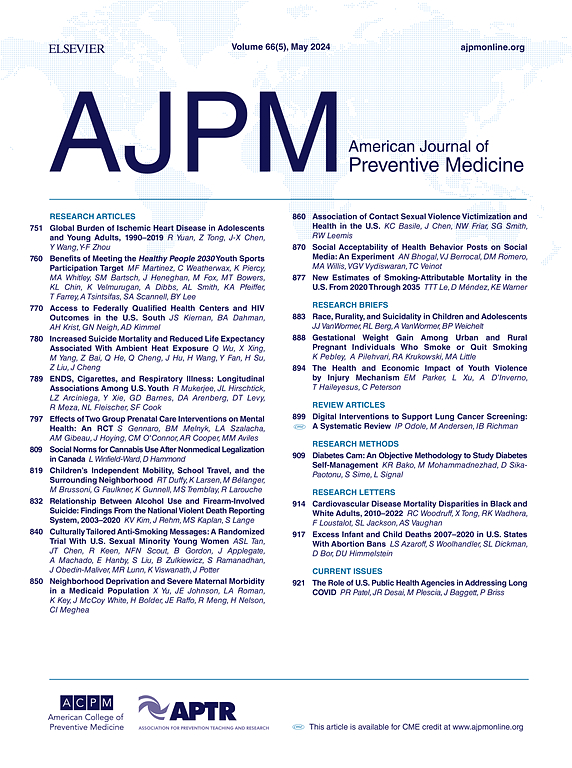太极拳与中医理论结合促进大学生身心健康的实践研究
IF 4.5
2区 医学
Q1 MEDICINE, GENERAL & INTERNAL
引用次数: 0
摘要
当代大学生面临着越来越大的学业和就业压力,导致焦虑和情绪不稳定等心理问题突出,这引发了人们对身心健康干预措施的关注。太极拳是一种传统的中国运动,强调身心的和谐。通过缓慢而刻意的运动,结合呼吸调节,它被认为有助于改善身心健康。研究对象与方法本研究采用随机对照试验,分为实验组和对照组各50人。通过标准化问卷调查、身体成分测试和心肺功能评估收集数据。采用GAD-7和CD-RISC量表进行心理健康评估,采用SPSS对干预前后结果进行统计分析。结果研究发现,太极拳组在身体和心理健康方面都有显著改善。身体成分指标均有积极变化,心肺功能指标也有改善。在心理健康方面的好处是显而易见的,焦虑水平显著降低,心理适应能力显著提高。结论:本研究结合中医理论,太极拳为解决健康挑战提供了一种整体方法,能够减少焦虑,增强心理弹性,提高身体素质。它强调了太极作为培养健康校园文化的工具的潜力,并为未来通过传统的健康实践促进大学生的健康提供了理论和实践参考。本文章由计算机程序翻译,如有差异,请以英文原文为准。
The Practical Research on the Promotion of College Students' Physical and Mental Health Through the Integration of Tai Chi and Traditional Chinese Medicine Theory
Background
Contemporary university students are facing increasing academic and employment pressures, leading to prominent psychological issues such as anxiety and emotional instability, which has sparked concern over interventions for physical and mental health. Tai Chi, a traditional Chinese exercise, emphasizes harmony between the mind and body. Through slow and deliberate movements combined with breath regulation, it is believed to contribute to the improvement of physical and mental health.
Subjects and Methods
This study employed a randomized controlled trial, who were divided into an experimental group and a control group, each consisting of 50 participants. Data was collected through standardized questionnaires, body composition tests, and cardiopulmonary function assessments. Mental health evaluations were conducted using the GAD-7 and CD-RISC scales, with SPSS utilized for statistical analysis of pre-and post-intervention results.
Results
The study found that the Tai Chi group demonstrated significant improvements in both physical and mental health. Positive changes were observed in body composition indicators, and cardiopulmonary function indicators also showed improvement. The benefits in terms of mental health were evident, with a significant reduction in anxiety levels and a marked increase in psychological resilience.
Conclusions
This study, integrating traditional Chinese medicine theory, Tai Chi provides a holistic approach to addressing health challenges, capable of reducing anxiety, enhancing psychological resilience, and improving physical fitness. It underscores the potential of Tai Chi as a tool in fostering a healthy campus culture and offers theoretical and practical references for promoting the health of college students through traditional wellness practices in the future.
求助全文
通过发布文献求助,成功后即可免费获取论文全文。
去求助
来源期刊

American Journal of Preventive Medicine
医学-公共卫生、环境卫生与职业卫生
CiteScore
8.60
自引率
1.80%
发文量
395
审稿时长
32 days
期刊介绍:
The American Journal of Preventive Medicine is the official journal of the American College of Preventive Medicine and the Association for Prevention Teaching and Research. It publishes articles in the areas of prevention research, teaching, practice and policy. Original research is published on interventions aimed at the prevention of chronic and acute disease and the promotion of individual and community health.
Of particular emphasis are papers that address the primary and secondary prevention of important clinical, behavioral and public health issues such as injury and violence, infectious disease, women''s health, smoking, sedentary behaviors and physical activity, nutrition, diabetes, obesity, and substance use disorders. Papers also address educational initiatives aimed at improving the ability of health professionals to provide effective clinical prevention and public health services. Papers on health services research pertinent to prevention and public health are also published. The journal also publishes official policy statements from the two co-sponsoring organizations, review articles, media reviews, and editorials. Finally, the journal periodically publishes supplements and special theme issues devoted to areas of current interest to the prevention community.
 求助内容:
求助内容: 应助结果提醒方式:
应助结果提醒方式:


